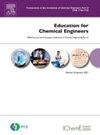A MATLAB-based simulator for the study of process control of fed-batch yeast fermentations
IF 3.5
2区 教育学
Q1 EDUCATION, SCIENTIFIC DISCIPLINES
引用次数: 0
Abstract
This paper presents a MATLAB-based simulator for the study of process control of fed-batch yeast fermentations that meets the educational needs of undergraduate and graduate students. Against the background of challenges in interdisciplinary education, the paper examines the evolving environment of simulation tools in the field of bioprocesses. It emphasizes the need for interdisciplinarity to prepare students for the complexities of the modern biotechnology industry. Built with accessibility and flexibility in mind, the simulator offers a modular structure with a graphical user interface (GUI) for novice users and direct access to MATLAB functions for advanced users. This design choice ensures ease of use for students with different programming backgrounds and allows for adaptability to alternative software environments. The introductory sections provide a detailed overview of the simulator development, including the mathematical models that govern biomass growth kinetics, mass transfer, and process quality indicators. Selected process control strategies such as rule-based and feedforward approaches are incorporated in the simulator to enhance the learning experience by allowing students to experiment with different scenarios. The paper concludes by emphasizing the simulator's adaptability, modularity, and user-friendly interface as a valuable asset in educating students about the complexities of bioprocess control.
基于 MATLAB 的模拟器,用于研究进料批次酵母发酵的过程控制
本文介绍了一种基于 MATLAB 的模拟器,用于研究喂料批次酵母发酵的过程控制,以满足本科生和研究生的教学需求。在跨学科教育面临挑战的背景下,本文探讨了生物过程领域仿真工具不断发展的环境。它强调了跨学科的必要性,以便让学生为现代生物技术产业的复杂性做好准备。模拟器的设计考虑到了易用性和灵活性,采用了模块化结构,为新手用户提供了图形用户界面(GUI),为高级用户提供了直接访问 MATLAB 功能的途径。这种设计确保了不同编程背景的学生都能轻松使用,并能适应其他软件环境。导言部分详细介绍了模拟器的开发,包括控制生物质生长动力学、传质和过程质量指标的数学模型。模拟器中纳入了选定的过程控制策略,如基于规则的方法和前馈方法,通过让学生尝试不同的情景来增强学习体验。论文最后强调,模拟器的适应性、模块化和用户友好界面是教育学生了解生物过程控制复杂性的宝贵财富。
本文章由计算机程序翻译,如有差异,请以英文原文为准。
求助全文
约1分钟内获得全文
求助全文
来源期刊

Education for Chemical Engineers
Multiple-
CiteScore
8.80
自引率
17.90%
发文量
30
审稿时长
31 days
期刊介绍:
Education for Chemical Engineers was launched in 2006 with a remit to publisheducation research papers, resource reviews and teaching and learning notes. ECE is targeted at chemical engineering academics and educators, discussing the ongoingchanges and development in chemical engineering education. This international title publishes papers from around the world, creating a global network of chemical engineering academics. Papers demonstrating how educational research results can be applied to chemical engineering education are particularly welcome, as are the accounts of research work that brings new perspectives to established principles, highlighting unsolved problems or indicating direction for future research relevant to chemical engineering education. Core topic areas: -Assessment- Accreditation- Curriculum development and transformation- Design- Diversity- Distance education-- E-learning Entrepreneurship programs- Industry-academic linkages- Benchmarking- Lifelong learning- Multidisciplinary programs- Outreach from kindergarten to high school programs- Student recruitment and retention and transition programs- New technology- Problem-based learning- Social responsibility and professionalism- Teamwork- Web-based learning
 求助内容:
求助内容: 应助结果提醒方式:
应助结果提醒方式:


